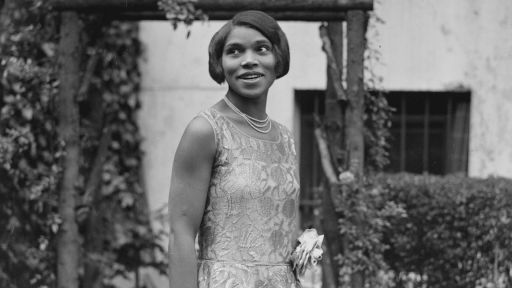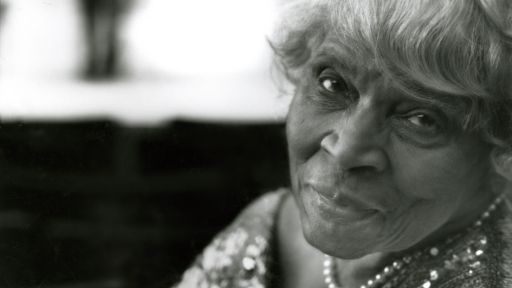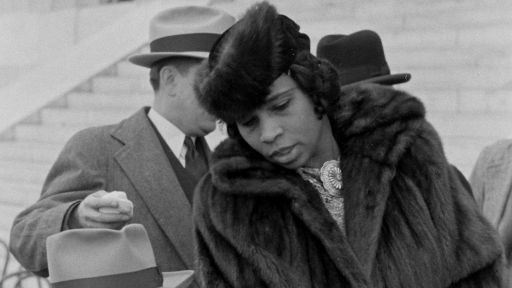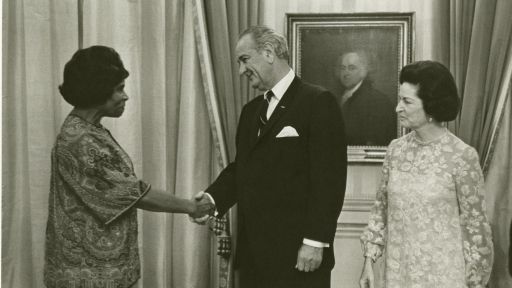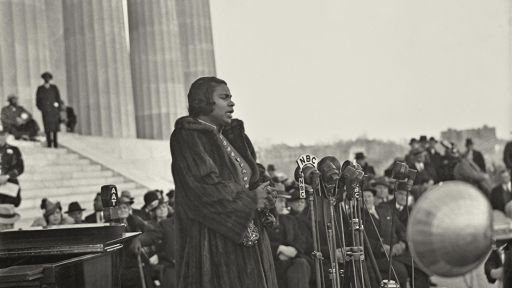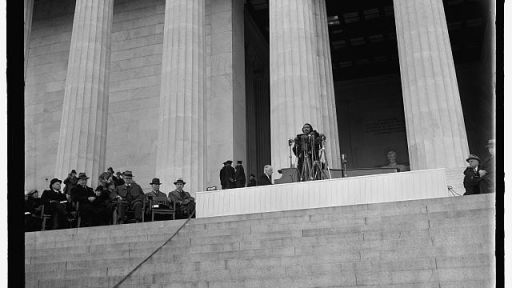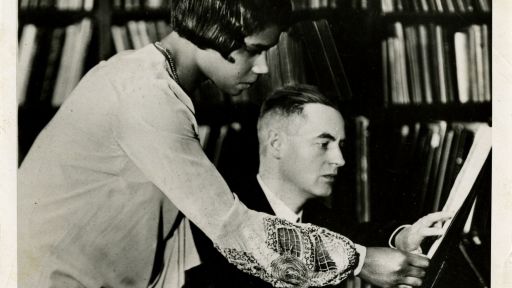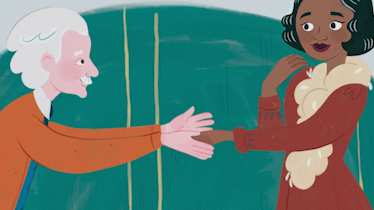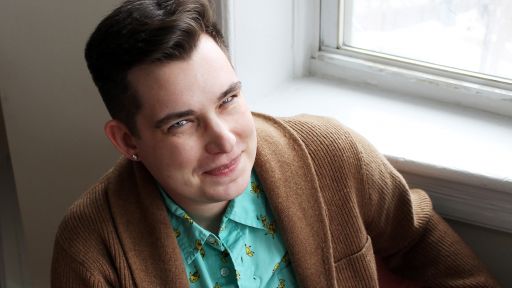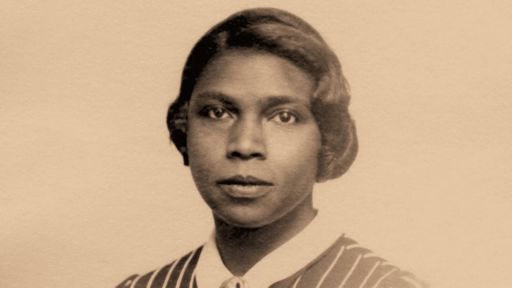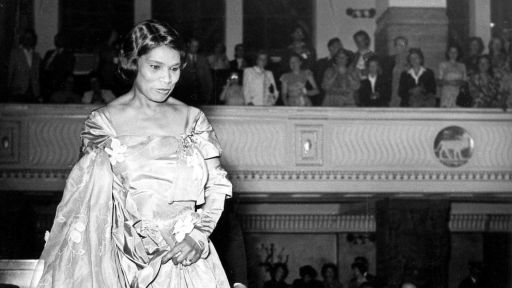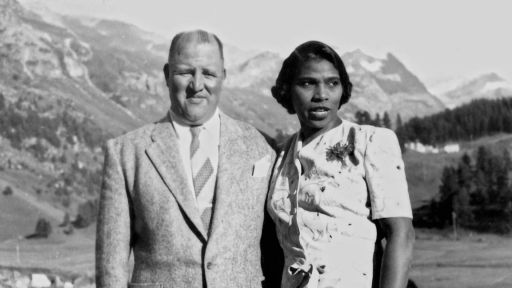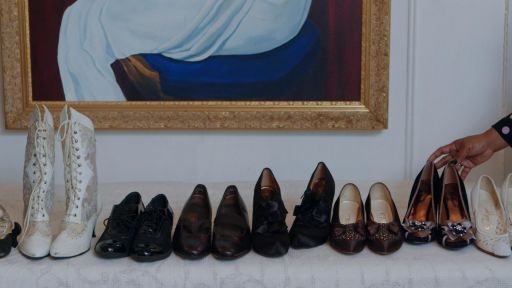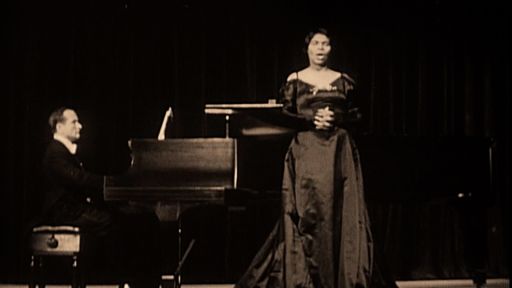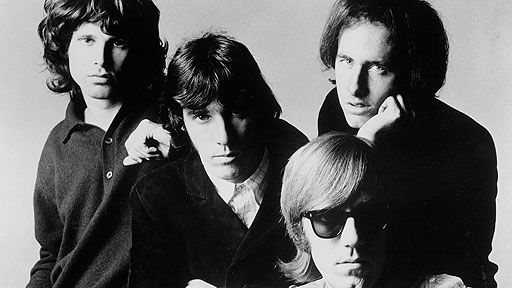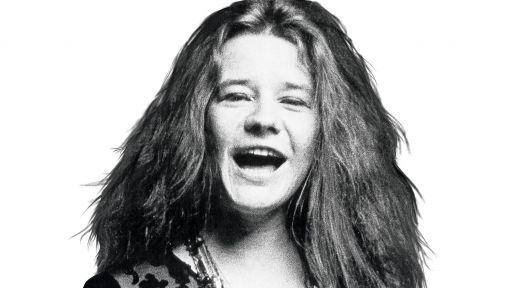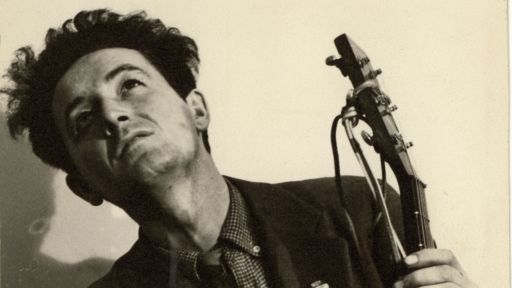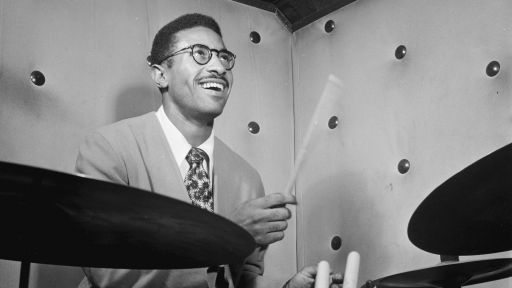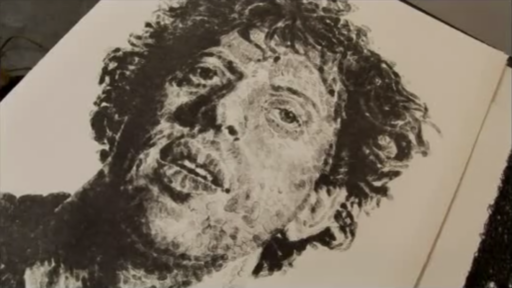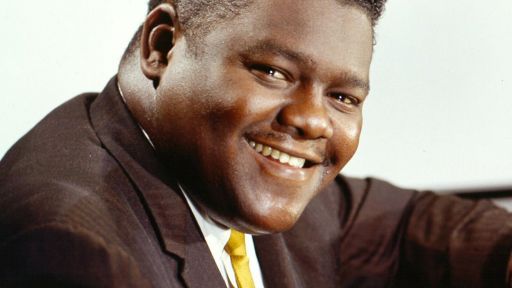TRANSCRIPT
♪ ♪ [ Applause ] -Will you enter, Mystery Challenger, and sign in, please?
-Are you a motion-picture actress?
-No.
-Have you performed on the Broadway stage?
-No.
-I heard such a tremendous hand when you walked in.
Does this hand -- Well, let's assume you have talent.
This hand also come from your -- from your beauty?
-No.
[ Laughter ] -Well, I can't let that stand.
I will say that there is talent here and beauty and all of the things that go to get the wonderful hand that you spoke about.
[ Marian singing operatically ] ♪♪ -She was the first African-American to make her debut at the Metropolitan Opera.
She was almost 60 years old.
[ Marian singing operatically ] -She was pursued by nobility and aristocracy.
[ Marian singing operatically ] She enjoyed the life of a diva.
[ Marian singing operatically ] ♪♪ -She was performing in Europe.
And you come back home... ♪♪ -A light was shown on racism, unlike any other time.
-Genius draws no color line!
-She uttered not a word in response, and she stood flat-footed... and she sang.
-♪ In the Lord, in the Lord ♪ ♪ My soul's been anchored in the Lord ♪ ♪ In the Lord, in the Lord ♪ -She was the chosen one.
-She was a powerful being... a powerful spirit... that changed the world through her singing voice.
-♪ In the Lord, in the Lord ♪ ♪ My soul's been anchored in the Lord ♪ ♪ In the Lord, in the Lord ♪ ♪ My soul's been anchored in the Lord ♪ ♪ God knows my soul's ♪ ♪ Been anchored in the Lord ♪ ♪♪ -♪ Steal away ♪ -I remember one day delivering the basket of laundry for my mother, and I heard a piano being played and somebody singing.
-♪ To Jesus ♪ -I went up the steps and peeked in the window.
♪♪ -♪ Steal away home ♪ -There, sitting on a piano stool, I saw a woman who looked not different than me and she was playing very well.
She was not dressed up.
She was unconscious that anyone was looking at her.
-♪ Steal away home ♪ ♪ I ain't got long ♪ -In that moment, I realized if she could, I could.
-♪ To stay here ♪ ♪♪ -Marian Anderson was born in 1897, the year after Plessy v. Ferguson, the Supreme Court decision that established the "separate but equal" doctrine.
All four of her grandparents were descended from slaves.
-♪ When Israel was in Egypt's land ♪ ♪ Let my people go ♪ -In the 1890s, Marian's grandfather, Benjamin, and Isabella, Aunt Marian's grandmother, moved from Virginia to Philadelphia.
They were part of the early migration of people moving from the South to the North for a better life.
-♪ Go down, Moses ♪ ♪ Way down in Egypt's land ♪ ♪ Tell old Pharaoh ♪ ♪ To let my people ♪ ♪ Go ♪ -Philadelphia had the largest free Black population before the Civil War, so it's had a long history of Black communities.
[ Children shouting playfully ] -There were middle-class Blacks, educated Blacks going back to the late 18th century.
-But the largest number of African-Americans in a place like Philadelphia were poor.
You have tensions between immigrant communities who are coming into Philadelphia fighting for the same jobs.
You also have tension between African-Americans who had been in Philadelphia for generations and new African-Americans.
-Marian's father, John, he was a hard worker.
He worked at the Reading Terminal as a laborer, a jack-of-all-trades.
He delivered coal.
And whites certainly made it clear that there were a lot of employment opportunities where Blacks were not welcome, and so they really had to scratch and fight for everything they got.
♪♪ -My father was a very handsome man.
-♪ La-da-da-da-da-da-dum ♪ -I remember hearing him -- ♪ La-da-da-da-da-da, da-dum ♪ That was his favorite thing to hum while he was getting dressed.
He was a very tall man, about six feet, and Mother's short, and I remembered hearing him tell mother when she was helping him put on his tie that she should get newspaper and stand on it to make her tall enough.
[ Laughs ] My father was a special officer in the Union Baptist Church.
I was taken along to church with my father practically every Sunday.
-The church was the epicenter.
We went to church for dinners.
We went to church for social events.
We went to church for religious services.
Sunday was an all-day affair.
-At 6 years old, we were taken to the children's choir with my aunt.
After a short while, the group was singing so well that we sang for the big Sunday school.
♪♪ By the time we arrived at our little house, the director of the choir had already been there and left.
My mother told my father that Mr. Robinson wanted to be sure that I would be able to be in church earlier the next Sunday because there were going to be visitors, and he wanted that we should sing for them.
My father said in reply to that, "I'm not going to have them singing my child to death."
[ Laughs ] My first public appearance.
[ Laughs ] -She grew quite the audience at that church.
♪♪ -My father bought our first piano.
Oh, you have no idea the joy.
-They knew she had this musical gift.
She seemed to just have this extraordinary sense of melody.
♪♪ -I remember taking one finger of his hand to make it go up the scale.
His fingers were so large that I could scarcely get them on one key at a time.
♪♪ He may even have tried to hit two notes to make me feel that he couldn't do it as well as I.
[ Laughs ] ♪♪ One fine day, I was sent to the store, and I saw something lying on the street.
It was, oh, a little handbill, but there was something in the corner that was strangely familiar to me.
There in the corner was a small snapshot under which it said, "Come Hear the Baby Contralto."
I was absolutely flabbergasted and stunned.
I was the proudest thing in the neighborhood.
♪♪ The amusing thing was they said, "The Baby Contralto, 10 years old," and I was then 8.
That was the first time that I had seen my name and my picture in print.
[ Laughs ] -Her father protected her until his untimely death in 1909 when she was 12 years old.
♪♪ -John was working on the track line, and he was struck on the head.
He didn't get the immediate medical treatment that he needed.
-He died in our little home.
-Aunt Marian's mother, Anna, wanted to take her daughters back to Virginia, where she was from.
But Aunt Marian's grandmother, Isabella, prohibited that.
-They immediately had to move in with her grandmother and grandfather, and the grandfather died the next year, and so it was just the grandmother, who was not a very warm figure.
-My grandmother was boss even of my mother, and she was the one who decided what should be done when, where, and how.
-Anna, her mother, got a teaching certificate in Virginia, but in Philadelphia, officials would not certify her to teach.
-She decided to take work as a domestic at the John Wanamaker Department Store.
♪♪ -My sister and I stopped in at Wanamaker's, and Mother was so busy and so intent on the job which she had to do, she didn't realize that anybody else was in the world.
♪♪ -Marian Anderson's grandmother insisted she work full-time to try to help support the family.
She had to leave school at the age of 12.
She worked, singing, but also working as a domestic, just anything she could get to help the family.
♪♪ Marian's Aunt Mary, her father's sister, was really the biggest influence on her.
♪♪ -At 13 or 14, my aunt took me with her to the senior choir.
The conductor was good enough to let us take the music home, and we learned everybody's part.
♪♪ The great piece of the choir was the "Inflammatus."
-The "Inflammatus" is a anthem that the Black Church would sing.
Even for the most trained singers, it's a tour de force.
There's a bunch of high C's in there, especially at the very end.
-It allows you to do a lot of rather nice gymnastics.
[ Laughs ] [ Operatic singing ] There seemed not to be too much vocally that gave one a great deal of trouble.
-For young Black women like Marian Anderson, there were fewer options for studying and for performing.
-We have all been conditioned, particularly in this country, to believe that with the art form of classical music, there's a different face than ours.
-Classical music was seen as something that only a European person should perform in or should be seen doing.
-[ Singing operatically ] -There were many African-American women singers who came along before Marian Anderson.
♪♪ Elizabeth Greenfield.
The Hyers Sisters.
"Black Patti," Sissieretta Jones.
-With Sissieretta Jones, it was just so fresh off of slavery that there was just very little chance of her breaking certain barriers.
-Most concert halls and opera houses are completely off-limits for Black singers.
African-American communities would create their own classical-music world.
They would stage operas.
They would stage full symphony concerts.
-The Theodore Drury Company in the 1902, 1903, 1904.
Harry Lawrence Freeman is a composer who was writing operas for Denver in the 1890s.
-Roland Hayes was somebody who was a trailblazer of trying to figure out, how could he create a career for himself in classical music?
-He was the first African-American superstar in classical music.
When he sang, you heard his soul.
-♪ Du bist die Ruh ♪ ♪ Der Friede mild ♪ -Every year, there was a gala concert, and the gala concert meant that Roland Hayes was coming.
Roland Hayes' program consisted of a group of Italian classics, German lieder, and French art songs.
-♪ ...dir ♪ ♪ Voll Lust und Schmerz ♪ -He would end it with Negro spirituals, and that was the only English on the program.
But there were a group of people who said, "Well, I think now we should have our Marian on the program because if she sings, we'll know what she's singing about."
[ Laughs ] -Roland Hayes realized Marian Anderson's ability, and he, in fact, gave her a big break in 1917.
He invited Marian Anderson to do the contralto part of Felix Mendelssohn's "Elijah" in Boston at Jordan Hall.
-♪ Oh, rest in the Lord ♪ ♪ Wait patiently ♪ ♪ For Him ♪ ♪ Wait patiently ♪ ♪ For Him ♪ -She was 20, and she got to meet a number of the best musicians in Boston.
-Roland Hayes would introduce Marian Anderson to his voice teacher, Arthur Hubbard.
Arthur Hubbard made an offer to Marian Anderson that he would help her to refine her voice, and in exchange, she would do maid service.
-♪ Wait ♪ ♪ Wait ♪ -Roland Hayes thought it would be a wonderful opportunity because I could even go to the studio and hear lessons of other people.
My grandmother didn't know what the advantage would be.
So far as she was concerned, I could sing.
So to Boston I did not go.
-Her grandmother did not want her to be a maid.
[ Bell clanging ] Her first trip to the South in 1917, she was invited to sing by a Black organization in Savannah.
-♪ Poor me ♪ ♪ Poor me ♪ -I went south while I was in high school, and my mother was my chaperone.
When we got to Washington, we had to get out of the train and get into the first coach.
The coach was called the Jim Crow Car.
-♪ Poor me ♪ -Anna and Marian thought they were going to be in a normal rail car, and it was shocking.
She had all these images as they were on the train of night riders, vigilantes coming to take her off the train.
Nothing like that happened, but she was terrified all the way down.
-It meant, of course, that one had to sit up all night, and that was what we did.
-♪ Poor me ♪ -I noticed some of my people were embarrassed to the very core.
There were others who accepted what they were having to live through.
They were not in the position to do anything at all.
-♪ Poor me ♪ -It was certainly necessary to do something about it.
-♪ Trouble will ♪ ♪ Bury ♪ ♪ Me ♪ ♪ Down ♪ -When she got to Savannah, they got a very warm welcome from the Black community, and it turned out to be a good experience for her.
♪♪ -In the summer of 1919, Marian Anderson traveled to Chicago for a six-week opera course.
She's coming from Philadelphia to Chicago during a time of unrest in the city.
-What you have is a growing Black population, and there's tensions between the Black population and the white population.
-An African-American young man had floated in the lake to the wrong side.
They threw a rock and hit him.
And he died.
There was a race riot.
-When she sang "The Crucifixion" in the 1950s, you could hear the memories of the South and the riots of 1919.
-♪ They crucified ♪ ♪ My Lord ♪ ♪ And He never said ♪ ♪ A mumblin' word ♪ ♪ They crucified ♪ ♪ My Lord ♪ ♪ And he never said ♪ ♪ A mumblin' word ♪ ♪ Not a word ♪ ♪ Not a word ♪ ♪ He bowed his head ♪ ♪ And died ♪ ♪ And He never said ♪ ♪ A mumblin' ♪ ♪ Word ♪ ♪ Not a word ♪ ♪ Not a word ♪ ♪ Not a ♪ ♪ Word ♪ -Although there was a riot going on in Chicago, she entered the competition of the National Association of Negro Musicians.
They were having their first festival.
And Marian Anderson won the competition.
She sang the aria "Adieu, Forets" by Tchaikovsky.
And it's Joan of Arc's aria.
[ Marian singing "Adieu, Forets" ] ♪♪ -The Chicago Defender runs a spectacular review of her singing, says everyone should hear this young woman sing.
It kicks her up to another level, and she's becoming known around the Black institutions.
[ Marian singing "Adieu, Forets" ] ♪♪ -Marian wanted to study music on a higher education scale.
-Her Aunt Mary encouraged her to try to get with a white music school, and the woman at the desk insults her, says, you know, "We don't take colored here.
What are you doing here?
You don't belong here."
-It was more a shock to me coming from a young person.
If it had been an old person, a sour-looking person, it would never have been quite a shock, but that there was a young person to come out bluntly and say, "We don't take colored," I was not prepared for it.
♪♪ I felt for the moment that all of my dreams were just shattered around my head.
[ Marian singing "Adieu, Forets" ] ♪♪ [ Indistinct conversations ] ♪♪ -Prior to the '20s, most people didn't graduate from high school.
You were lucky if you had a year or got through the eighth grade.
Anna really wanted Marian to finish.
One thing that helped her was that she always looked younger than she was.
She graduated from high school at 24.
While she's still in her early twenties, she meets Orpheus Fisher, known as King Fisher.
-There was this very tall and fine-looking young man in the door, and as I tried to get in, he stretched his arms across the door and wouldn't let me in, all the time grinning and giggling.
-Orpheus Fisher came from a solidly middle-class family, all of whom had light skin.
He could pass for white, easily, and sometimes he did.
-When I went in, I met another very charming young man, much shorter than the one whom I'd seen at the door, but I could see a very strong family resemblance.
♪♪ One brother would come over to see me, and then they would both come together for quite a while.
And then one day, the one who had stood in the doorway, he moved his hand across the back of the sofa and touched my shoulder.
And I saw the little paper, so I took it as discreetly as I could and looked at it.
It said, "This affair between you and my brother has got to stop."
[ Laughs ] ♪♪ When my young man was finished with school, he would come over to our house.
We saw a good deal of each other for quite some time.
We knew that we would marry.
♪♪ -"My dearest Marian, I shall be waiting for you with open arms.
Love always, Orpheus."
♪♪ -♪ Every time I feel the spirit moving in my heart ♪ ♪ I will pray ♪ ♪ Every time I feel the spirit moving in my heart ♪ ♪ I will pray ♪ ♪ 'Pon the mountain my Lord spoke ♪ ♪ Out His mouth came fire and smoke ♪ ♪ In the valley, on my knees ♪ ♪ Asked, "My Lord, have mercy, please" ♪ ♪ Every time I feel the spirit moving in my heart ♪ ♪ I will pray ♪ ♪ Every time I feel the spirit moving in my heart... ♪ -The pastor decided to take up a collection.
I remember him saying, "We want to do something for our Marian.
She is like an old shoe."
[ Laughs ] -When you find somebody talented like Marian Anderson, what the church does is recognize, "Let us put some resources so we can help build that talent, because her success is our success."
-We were invited to sing at as many churches as we could possibly go.
♪♪ From the YWCA to the YMCA to the Methodist Church, to the Episcopal Church, to the Baptist Church.
There was always something given at different churches.
And sometimes in an evening I would appear at three different places singing the same song, which I played myself.
Sometimes I would arrive home with a dollar, sometimes a dollar and a half, sometimes two dollars.
I was as busy -- you cannot imagine -- and my aunt would run with me from one place to the other.
♪♪ On one of these occasions, Billy King showed up, whispered in my ear and said, "May I?"
I was absolutely thrilled to pieces.
-Billy King was a very talented musician.
He was an accompanist for a variety of musicians, including Roland Hayes.
-He suggested that in order to raise money, he would set up a United States tour.
Their musical relationship would take off.
♪♪ -The tours that we took, Billy and I, carried us mostly in the South.
One felt that now we're getting to have a career.
-In 1923, Billy King had become her manager.
-We sang in the Negro colleges and universities and churches.
♪♪ -She couldn't have traveled the way she did in the South and the Midwest in those years without Billy.
A single Black woman alone would have been very, very dangerous for her.
I think he wanted to marry her.
He was jealous of Orpheus Fisher.
-I didn't have that same feeling about Billy.
In a way, he was a boyfriend without the other things that go with it.
-"Is that Billy King staying in his place?
I'm dying to see you and hear about all of the things that you have done and planning on doing.
Always yours, Orpheus."
-Billy King was able to make money, and I was able to make money.
All of this led up to bigger concerts and longer tours and appearances in places where one might attract the attention of people who were not only church people or college people.
And one day, one picked up the phone and called the Wanamaker Store.
I had never had the satisfaction in my life that I got the morning I told Miss Hennessy in as breezy a tone as I could muster up that my mother would not be coming back to work there anymore.
There was a small house on Martin Street.
Mother and I put money in together to get the little house.
Then we went to Mr. Boghetti.
In the studio, one had a completely new and different training.
-Giuseppe Boghetti was a dynamic vocal coach and artist based out of Philadelphia, and he was known around the world.
Mr. Boghetti had a full slate of students and didn't feel that he could fit in one more.
-The song which we sang for Mr. Boghetti was "Deep River."
-♪ Deep river ♪ -She was able to deliver "Deep River" with such artistry that Mr. Boghetti said he would take her right away.
♪♪ -Among the things which Mr. Boghetti gave me to learn was the "Ave Maria," and he gave me to learn the three verses, and it seemed to me to be the longest and the most drawn-out and the most uninteresting thing that there was.
And I did not know any German, and it was really a great trouble.
The "Ave Maria" was put by the side.
-He had a particular approach to classical music, and it was, you know, bel canto, which really favored sopranos.
Although she had a three-octave range, she sang in the contralto mode.
-Contralto being the lowest possible female voice.
She could sing that to break your heart into a million pieces.
But she also had a great top.
She had a great high C. And her voice could live above the staff, meaning in soprano territory.
-I don't feel that the singing of high C was any trouble at all.
To me, it was a lark.
[ Marian vocalizing scales ] One did not confine herself to being either soprano or contralto or anything else, but one was billed as a contralto.
[ Marian vocalizing scales ] ♪♪ -"How did things go?
Did you do as well as expected?
I know you did.
Little Marian always does her best, even in loving me.
Ha!
Ha!
Always, Orpheus."
♪♪ -Orpheus came along and asked me if I would run off with him to marry.
Well, the thought of it just terrified me.
♪♪ I didn't have any idea what we would do.
He was in school, and I wasn't out of school, and I knew that if we should marry, we should expect the things that people do expect when they get married.
I would have to give up my work, I would have to do this and that and the other.
♪♪ I realized that I could not marry then, and I think that he realized it, too.
♪♪ And then he went off to New York.
[ Marian singing operatically in German ] ♪♪ -In 1924, she gets a contract to sing at Town Hall.
It was a mid-Manhattan venue that was kind of a testing ground for artists.
-My great desire was to sing German because it was one of the things that Roland Hayes had done.
[ Marian singing operatically in German ] Mr. Boghetti gave me four songs by Brahms.
In these translations, you do not always find the meaning of the same word in English, so it is not too unlikely that in trying to be very proper about it, that your accents go the wrong places.
-It's quite a leap for her -- a very discerning New York audience.
-For me, it was a big day, and I felt for all the world like a prima donna.
Mr. Boghetti said to me the house was sold out.
The house was maybe just a third filled.
And all of the enthusiasm and everything else that I had built up for this concert seemed to fall to my feet.
♪♪ ♪♪ -It just left a negative impact for her to have to wear.
-I was embarrassed.
I didn't want to see music.
I didn't particularly want to hear it.
And I was pretty sure that I would choose something else as my profession.
♪♪ My mother said to me, "My child, listen.
Whatever you do in this world, no matter how good it is, you will never be able to please everybody.
But what one should strive for is to do the very best humanly possible."
♪♪ It was probably a whole year before I got really the urge or felt that nothing else would take the place that music had taken.
-1924 was a dark time for Marian Anderson.
Her Aunt Mary dies.
The love of her life, Orpheus King Fisher, married a white woman and was passing as white.
She took blow after blow in 1924.
-Quite often when you have a calling and there are these low points, something will happen that will get you back up on the horse.
-The NAACP awards Roland Hayes the Spingarn Medal, which is the highest honor the NAACP gives.
-And he spoke with Walter White of the NAACP about having Marian Anderson sing at this ceremony.
-She was just glorious that night.
She gets her confidence back.
-It was a happy day when one came back and began to sing.
-It was one of those very dangerous moments when she could have ended and we would not have had the Marian Anderson that we come to know and love.
♪♪ -Marian Anderson was the first African-American artist to be signed by RCA Victor.
♪♪ And that recording was Harry T. Burleigh's "Deep River."
-♪ That Promised Land ♪ -I went into the store, and on the gramophone, they played "Deep River."
My heart began to jump like mad, and I was flustered beyond anything you can imagine.
-♪ Oh, deep... ♪ -That was my first experience of hearing my voice on a gramophone.
-♪ River ♪ ♪ Lord ♪ ♪ I want to cross over ♪ ♪ Into campground ♪ ♪♪ -1925 turns out to be a great sort of comeback year for Marian Anderson.
Giuseppe Boghetti enters her into an annual musical competition.
-Mr. Boghetti said to me, "Whatever happens, don't stop until you get to the end and you can do your trill."
-She's considered to be so good that they cancel the later auditions and they just give her the prize.
[ Marian singing operatically ] ♪♪ ♪♪ -The prize was to sing with the New York Philharmonic, and no African-American had ever done that before.
So, all of a sudden, she's breaking these barriers.
-There was a certain thrill walking to stand next to the conductor, and as I remember it, the stadium was just jam-packed.
[ Marian singing operatically ] And it was naturally one's great, great, great moment.
[ Marian singing operatically ] ♪♪ ♪♪ [ Song finale plays ] -It just catapults her.
That's one of the things that convinces her that she can now go to Europe.
♪♪ -Taking practically all the money that one had saved up, which was about $1,700, and leaving behind in the bank sufficient money to bring me home should everything go wrong, off I went the first time to England.
-When she got to Europe, they could stay in any hotel.
There were no separate drinking fountains.
Jim Crow did not apply in Europe.
-Europe did not have the history that America has had with African-American people and people of color.
Didn't have that stain.
-Many of the cultural performers began to recognize that while they weren't getting an opportunity to play in the big venues in the United States, in Europe they were.
And they are paid better.
Mostly they are treated better.
-[ Singing operatically ] -Josephine Baker became a prominent French entertainer, singer, dancer.
[ Cheers and applause ] -Paul Robeson was cast across from a white actress at the Savoy Theatre.
This was something that was not happening in the United States, where you still had this strong tradition of blackface.
-One felt a freedom in London.
I stayed in the house of John Payne.
-He was a famous baritone.
He had this beautiful house.
It was a kind of boarding house for Black musicians.
She met Alberta Hunter there.
She met Josephine Baker, Paul Robeson, Amanda Aldridge, who was a great Black soprano and famous within the Black community, a voice teacher.
She becomes her student, and she gets training like she's never had before.
Prior to that time, she had only spoken German phonetically, and she hadn't tried much Italian at that point.
She really wasn't a linguist so much as she was a mimic.
-A lot of the stereotypes that surround African-Americans was that we couldn't even speak English correctly.
How were we supposed to learn French or German or Italian?
-In order to be a first-rate artist, a great deal of time and a great deal of energy would need to be spent in this direction, as well as with the voice.
-I don't think she really expected to do much concert singing.
She was going more as a student.
But she ends up giving several concerts.
The most famous is at the Wigmore Hall, where she just dazzles the crowd.
[ Marian singing operatically ] ♪♪ ♪♪ ♪♪ ♪♪ ♪♪ -It's an eleven months that transformed her life and her career.
[ Sea birds crying ] [ Bell clanging, ship horn blows ] ♪♪ ♪♪ -Having had a concert in Chicago, one received a card on which there was, "Mr. Rayfield wants to see you after the performance."
Mr. Rayfield was a representative of the Rosenwald.
-The Rosenwald Foundation, which was a philanthropic organization which had been started back in 1915, often gave to Black institutions, and they sometimes sponsored individual artists.
-They asked me what my desires were, and I told them that I would like very much to go to Germany and learn something about German lieder.
-In a few weeks, she was granted a $1,500 Rosenwald grant.
-And off I went to Germany.
♪♪ There came through Berlin two men.
One was interested in talent because he was a manager in Norway.
He wanted to know if one was available for concerts.
And then he said to me, "If you come to sing, this man will play for you," and that was Kosti.
I was, of course, naturally very impressed.
-Kosti Vehanen, the great Finnish pianist.
He was a very gentle, absolute supreme musician and perfectionist in the same sense that she was.
And they just bonded.
-Kosti Vehanen, having listened to Marian Anderson, and said, "The voice is spectacular, and the lady's spectacular.
"She will be, as you say today, a hit."
[ Marian singing operatically ] ♪♪ -Kosti introduced me to the music of Sibelius.
[ Marian singing operatically ] ♪♪ One day, Kosti said to me, "When we go to Finland, maybe we can go and see him."
"Oh," I said, "I doubt that we could see him."
He said, "You wait.
I think maybe I can arrange."
-Sibelius was definitely not just another good composer.
He was a national figure.
♪♪ "Finlandia" is almost their national anthem.
♪♪ So you didn't just meet Sibelius.
You asked for an audience.
-We were told before we went that he would have just a half an hour, that we were to have coffee.
Sibelius was not quite as tall as I had expected him to be, whose head was quite bald and quite like something that had been chiseled out of marble.
And, so, we sang.
[ Marian singing operatically ] ♪♪ ♪♪ And he came over to me, embraced me and said, "My roof is too low for you."
And then he said in a loud voice, "Champagne, champagne!"
We stayed there a bit more than the half an hour.
I came away having felt very rewarded for having had this experience.
And as if a sort of veil or curtain had been lifted, one approached the songs of Sibelius and the songs of Scandinavia in a different way.
[ Marian singing operatically ] ♪♪ ♪♪ ♪♪ ♪♪ -Her first concerts were sold out in a minute, and people couldn't get tickets.
-They went in thinking they were going to see this Black singer who was going to be exotic, and they came out thinking, "I don't know what I just experienced, but I've never experienced anything like this in my life."
-Many of them probably had never seen a Black person.
-She was Black and she was tall and had a Swedish name.
"Anderson" is among the five most common names.
It's like "Andrew's son."
It was exciting.
♪♪ -The success there was something which one had not really expected, and it began to make one feel that all of this was very, very worthwhile.
The paper called it "Marian Fever."
♪♪ -People who knew her said that she was an extremely intelligent and focused woman and a nice person.
And personalities matter in this "fever" business, if you wish.
I mean, she was just plainly loved by everybody.
-The audiences in Finland made me feel that I would like to give lots of concerts in Finland.
[ Marian singing operatically ] ♪♪ ♪♪ ♪♪ We were in Norway, Denmark, and in Paris.
♪♪ -♪ Oh, what a beautiful city ♪ ♪ What a beautiful city ♪ ♪ Oh, what a beautiful city ♪ ♪ Twelve gates a to de city ♪ ♪ A-halleluh ♪ When the success reached the proportions that they did, I was rather overwhelmed.
♪♪ I wrote my mother and asked her if she would be interested in coming to Europe.
She replied that she would like very much to come to Europe.
I went with her to several of the places, to the Louvre and to Eiffel Tower, many places that she had read about before, not knowing that she would ever see.
-She meets Sol Hurok.
-Sol Hurok played an enormous role in shaping American culture in the 20th century.
An impresario is someone who takes on the financial risk of presenting an artist and then, of course, gets a percentage of the box office.
-He had worldwide performers, not just singers.
-He was like the Cadillac of of the performing-arts world.
-When he endorsed someone, that person is expected to prove themselves and to be what he says, and, of course, they usually are.
-He was very much in the know about who was rising and who was trending and who was popular.
He goes to hear her at a recital she gives at the Salle Gaveau in the spring of 1934.
-Mr. Hurok came back in the intermission.
I felt as probably some marathon runner must have felt after he had finished a long race.
-He senses that this is someone he could take a chance on, and so he starts to begin to think, "Oh, how can I promote this woman?"
♪♪ -And people told him, "You won't be able to make a penny off her.
You won't be able to get her any bookings."
♪♪ -She goes to the Soviet Union.
At that point, it was sort of an obverse image of Jim Crow America.
There were a number of Blacks who relocated in the Soviet Union.
They didn't know about the purges that had already begun by Stalin.
She never made any endorsement of communism or of Stalin, but just Russian people.
She was warned that this was an atheistic regime and she was not to sing any Christian music, no spirituals.
-♪ I got a robe, you got a robe ♪ ♪ All of God's children got a robe ♪ ♪ When I get to Heaven, going to put on my robe ♪ ♪ Going to shout all over God's Heaven ♪ -There was never any question that she was going to bow to that kind of intimidation.
-We went off the stage.
Before we got to the door, we heard a great, great noise.
And I said to Kosti, "What on Earth is going on?"
He said, "I don't know."
The people had their hands over the edge of the stage pounding on the stage.
I had never before nor since seen anything like that, so we went out, and before we got to the piano, somebody yelled out, "'Deep River,' 'Deep River'!"
And someone else yelled, "'Heaven, Heaven'!"
-♪ Going to shout all over ♪ ♪ God's Heaven ♪ -There's sort of good news and bad news.
She's now a celebrated figure, and she gets the best concert dates, in part because of Sol Hurok, who's arranging them.
[ Military music plays ] The bad news is, is that countries like Austria and Germany, rising fascism and Nazism, and intolerance towards all non-Aryans, particularly Africans and African-Americans.
So there are certain places like Berlin where she can't sing.
-They ask one question -- "Can you tell us if Marian Anderson is an Aryan?"
And that was the end of all the correspondence.
-She can still go to Austria.
♪♪ -Marian Anderson's rise to worldwide fame is quite typically an American success story.
It was not until 1935 when worldwide recognition came to her.
She was invited to sing at the Salzburg Festival, a most dazzling opportunity.
♪♪ -When the archbishop of Salzburg hears Marian Anderson perform, he immediately fell in love with her voice.
He invited her to come to Salzburg to perform as part of the famous Salzburg Festival.
-The problem was, the Austrians in some ways were almost ahead of the Germans in their intolerance.
They won't put her on the program.
♪♪ -Salzburg had itself become a hostile place.
A lot of Jewish performers had stopped going.
And then in 1932, there's an African-American baritone named Aubrey Pankey.
His concert is broken up by Nazi rioters.
They protest and say that a Negro who sings German music is jeopardizing German culture.
Salzburg has become a hostile place in so many ways for Black singers.
But she went anyway.
[ Marian singing operatically ] ♪♪ ♪♪ -She became this symbol of resistance.
-Very few people attended the Anderson concert.
There was no publicity.
During intermission, that small audience went out and told people how magnificent she was, and so her audience grew.
Her supporters arranged another recital not far from the Salzburg Festival.
-Everybody who was anybody was there.
Arturo Toscanini was there.
-Toscanini was considered by me the greatest orchestral conductor of his time.
He was a giant.
-One had read a lot about Toscanini, but one had not seen him ever.
We knew beforehand that he was going to be at the performance, and, of course, that doesn't make one so easy.
When it was over, Madam Cahier, she brought Toscanini backstage.
By the time he got back there, I was just about speechless.
-He said to her, "One only has this experience once in a hundred years."
Sol Hurok took that compliment and ran with it.
It was the beginning of her international stardom.
♪♪ -A master builds something he knows that he doesn't have to have the finishing tools at the beginning of his job.
It was systematic.
It was a little more, a little more, a little more each year.
♪♪ It then happened that one was billed as a special attraction.
♪♪ You have to have the right kind of handling, you have to have the right kind of publicity, and you have to have, above all, someone who has a deep personal interest, and that, I believe, is what Mr. Hurok has had.
-Marian Anderson learned a lot about life while having her time abroad.
She was pursued by nobility, aristocracy, and the common man alike.
-She had a kind of brief but torrid love affair with a Russian actor named Emmanuil Kaminka.
She never talked about it much.
She had passions about things other than music.
-"Dear Ida, I've had a most wonderful time.
The one A is quite fine looking, quite tall, clever, a good dresser, and marvelous company.
B came, and I was prepared to go for a walk with him.
A rushed to me and said, 'Are you going out?'"
[ Laughs ] "All I could do was giggle."
♪♪ -"This is my fifth letter to you, and I shall write until you answer my letter."
♪♪ -"I really intended to write you an entirely different kind of letter, but since it would take more time than I now have, I send you this one."
♪♪ -"I was down to see your mother the other night.
When I get lonesome for you, I go to Martin Street and sit and think and think, and I can almost imagine you here with me.
I must see you soon, even if I must come to England to see you.
I do think you should come home now.
You have been away long enough.
I expect to be a free man by December or sooner.
I'm yours always, Orpheus."
-"I'll be home in December.
Do take care of yourself and let me hear from you immediately.
Always, Marian."
-We looked forward with the greatest excitement to the departure from Europe for the United States.
♪♪ We arrived just before Christmas.
-New York, racially, was very different than the South and many other parts of the country.
There was much more mixing of races, even though there still was discrimination.
But Hurok knew that, in New York, presenting a Black singer like Marian Anderson, that it could work now, and Town Hall was a very important venue.
-The community that supported Marian, that loved Marian, that wanted her to succeed, was championing for William "Billy" King to be her accompanist, and they wanted to see him behind that piano at Town Hall.
-I can well understand that, among my people, there were those who felt that if there was an opportunity to be given, that one of my own should have the opportunity.
It had nothing to do with my wanting an accompanist of one color in preference to one of another.
It was a thing of having worked and feeling that at that time I could give a better performance with Kosti than I could with anyone else.
-[ Vocalizing ] ♪♪ ♪♪ ♪♪ -[ Singing operatically ] ♪♪ -It was sold-out, and it was filled with illustrious stars like Katharine Hepburn and Gloria Swanson.
-"I stood with Miss Gloria Swanson on one side and Katharine Hepburn on the other, sharing my precious program with both.
Your dressed stage appearance was just too, too divine."
-[ Singing operatically ] -"I wanted to come backstage to see you, but I knew that there would be so many more important people than I."
-[ Singing operatically ] -"I decided to wait for the day when I could have you all alone."
-[ Singing operatically ] ♪♪ [ Applause ] -She had the great triumph at Town Hall and then later at Carnegie Hall.
By the end of the spring of 1936, she had had dozens of other concerts.
People are now talking about her as one of the greatest singers in the world.
-Eleanor Roosevelt invited Marian Anderson to give a concert at the White House in 1936.
-They wanted her just to sing spirituals, and she said, "No, no.
It'll be a mixed program."
-After Marian Anderson sang, Eleanor Roosevelt went over to her mother and took her mother's hand and walked her over to meet and greet FDR.
And this was a very intimate moment between the Anderson family and the residents of the White House.
This was an enormous moment in the changing patterns of American history.
-As famous as she was, she still suffered racial discrimination.
-♪ I'm trampin' ♪ ♪ Trampin' ♪ ♪ Trying to make Heaven... ♪ -In hotels, I usually have my meals in my room.
-♪ I'm trampin' ♪ -I steered clear of being embarrassed should I go to the dining room.
-♪ Trampin' ♪ ♪ Trying to make Heaven my home ♪ -You had, of course, every problem with hotel bookings.
One is white, and one is Black.
All sorts of troubles that Marian Anderson hadn't seen in years and, of course, that Vehanen had never seen before.
-♪ My home ♪ -Can you imagine what it was like performing for kings and queens, then she would come back home to her own country and then have to get on a Pullman car in a train and have to sit at the back of the train because of the color of her skin?
-♪ My home ♪ -You cannot be expected to give as good a performance as you would hope to if your mind is partly on the fact that you are someplace but you certainly are not wanted there and you're trying to sing to a group of people as if your heart is full of love and happiness, and it isn't completely.
-♪ And make Heaven my home ♪ -1937, she comes to Princeton, New Jersey, and she's trying to check in to the Nassau Inn.
-And they turn her away.
Whites-only policy.
Albert Einstein -- he hears about this and he rushes over and invites her to stay with him, which she did.
-♪ Hallelujah ♪ -Dr. Einstein greeted one warmly and said, "We are very happy that you can come and welcome into our home."
I remember thanking him from the bottom of my heart, and he seemed just sort of to brush it aside.
-♪ Trying to make Heaven ♪ ♪ My ♪ ♪ Home ♪ -She stayed with him for the next 18 years, every year when she came to give a concert.
♪♪ -Mr. Hurok sought to put one in places that were the kind that the other artists would appear in, and among such places, naturally, Washington.
-Marian Anderson was supposed to sing at my alma mater, Howard University, but the space was just too small.
-The Washington, D.C., School Board, which controlled access to the auditorium of the all-white Central High School, turned her down on suspicion that her request was a subterfuge for school desegregation.
The Marian Anderson Citizens Committee, one of the first examples of interracial civil-rights activism, was created.
-So they were looking for a larger venue, and Constitution Hall was the largest.
-Which the Daughters of the American Revolution owned, a very old and distinguished and conservative organization for women who traced their ancestry back to the American Revolution.
And the D.A.R.
had a whites-only policy.
-We were out in San Francisco, and we passed by a newsstand, and I saw the article "Eleanor Roosevelt takes stand."
-Eleanor said that they had missed an opportunity to lead with enlightenment and that she could not be a part of the organization if it was going to miss an opportunity in that way.
-No first lady had ever done anything like this.
It was explosive.
Suddenly, everybody was talking about it.
That made it a national and international issue.
-Hurok tried to keep her away from all of the controversy.
He protected her from the ugliness.
-Walter White was the head of the NAACP.
They had to find her another venue.
-Lulu Childers, who was a faculty member at Howard, suggested almost in an offhanded way, "What about the Lincoln Memorial?
There's never been a concert there."
They have to get FDR's approval, so they rush over to the White House.
Of course, he'd been hearing from Eleanor for weeks about Marian Anderson.
He was so sick to death of hearing about this issue.
They catch him just before he's leaving for the train.
His answer was, "She can sing from the top of the Washington Monument for all I care!"
♪♪ ♪♪ They only had a week to prepare.
They had to arrange security.
Didn't know whether it would be 5,000 or 50,000.
They were worried about white-supremacist groups.
The concert was scheduled for the afternoon of Easter Sunday, April 9, 1939.
-We arrived in Washington.
-No hotel would accommodate them.
They go for a soundcheck around noon.
-We went to see how the piano was situated and about the public-address system.
Already, there were some people milling about.
♪♪ -Good afternoon, ladies and gentlemen.
We're speaking to you from the steps of the Lincoln Memorial in the nation's capital.
-Seated on that landing were the members of the Supreme Court and the Cabinet, the Vice President.
-There were people who were not fancy upper-class people who would normally go to concerts.
There was an interracial audience, which was a big deal in 1939.
-Genius draws no color line!
We are grateful to Marian Anderson for coming here to sing to us today.
[ Cheers and applause ] -When we went out onto the steps, my heart was throbbing to the point that I could scarcely hear anything.
[ Cheers and applause ] It seemed to me as far as the eye could go there was a multitude such in your wildest imagination.
[ Cheers and applause ] ♪♪ As well as I know "America," for a while, one was carried away to the point that the words did not come.
♪♪ -♪ My country, 'tis of thee ♪ ♪ Sweet land of liberty ♪ ♪ Of thee, we sing ♪ ♪ Land where my... ♪ -I as an individual was not important on that day.
It happened to be the people whom I represented.
I think if you have something to offer which can help a situation, then I think you should do it in your own manner.
-♪ Let freedom ring ♪ [ Applause ] -When all of us learn this song in grade school, we learn it as, "My country, 'tis of thee, sweet land of liberty, of thee, I sing."
Aunt Marian changes the words so that you hear, "Of thee, we sing," making it clear that this country belongs to all of us -- Black people and white people and the purple people and everybody else.
-♪ Oh, the gospel train, I'm a-comin' ♪ ♪ I hear it just at hand ♪ ♪ I hear the car wheels rumblin' ♪ ♪ And a-rollin' through the land ♪ ♪ Get on board ♪ ♪ Little children, get on board ♪ ♪ Little children, get on board ♪ ♪ Little children ♪ ♪ There's room for many a more ♪ ♪ The fare is cheap, and all can go ♪ ♪ The rich and poor are there ♪ ♪ No second class aboard this train ♪ ♪ No difference in the fare ♪ ♪ And get on board ♪ ♪ Little children, get on board ♪ ♪ Little children, get on board ♪ ♪ Little children ♪ ♪ There's room for many a more ♪ [ Applause ] -I was one of the student body surrounded by 75,000 people standing out there that cloudy day.
Marian Anderson was the first one who made me realize that through art and music, she could reach inside me and just lift me from all that negativity and make me something else.
♪♪ That Sunday will live forever.
♪♪ -♪ Ave ♪ ♪ Maria ♪ ♪ Jungfrau ♪ ♪ Mild ♪ ♪ Der Erde und der Luft Daemonen ♪ ♪ Von deines Auges Huld verjagt ♪ ♪ Sie koennen hier nicht bei uns wohnen ♪ ♪ Sie koennen hier nicht bei uns wohnen ♪ ♪ Ave ♪ ♪ Maria ♪ ♪♪ ♪♪ [ Song ends ] [ Applause ] -Her appearance at the concert was very carefully staged.
-We see this iconic image that in many ways registers as classic Black ladyhood.
-It was sort of beyond the bounds of American culture to admit that a Black woman could be beautiful.
♪♪ -There's a long history of negative portrayals of Blackness in America.
There are figures trying to show Black women as really exotic but also erotic.
But Marian Anderson, with her own self-presentation, just challenged so many people's ideas of what Black women were.
She had this gracefulness to her and this dignity, and she held onto it at a time when everything around her was trying to strip her of it.
♪♪ -The weeks after the concert were pretty heady.
She went to the World's Fair in New York and was just lionized by everyone there.
She went to the set of John Ford's film "Young Mr.
Lincoln."
The crowd was more excited about her than they were about Henry Fonda.
-Marian Anderson became Hurok's highest-grossing artist.
She made $175,000 in a year.
That's an enormous amount of money in 1941.
Today that would be worth something like $3.5 million.
She was awarded the Spingarn Medal, the most prestigious award of its kind presented by the NAACP.
She went from being simply a very well-known performer to being an icon for Black Americans.
-Eleanor Roosevelt invites Marian Anderson to the White House to sing for the King and Queen of England.
♪♪ -World War II probably enhanced her reputation as a symbol for civil rights.
-She visited Black troops wherever they were, and white troops, too, but she made a point of having special occasions with African-American soldiers.
♪♪ The next four years throughout the war, she was sort of a one-man band, raising funds for the war effort.
♪♪ -Marian Anderson made a number of very visible appearances in support of Black Americans.
-The 1943 concert for China Relief was at the D.A.R.
's Constitution Hall.
She chose the China Relief War Charity because it was Paul Robeson's designated charity and he was not allowed to sing at Constitution Hall.
♪♪ -To speak out was not her manner of character, but she stood by him.
♪♪ She had a great triumph in her personal life during the war.
In 1943, she's 46 years old.
After a 25-year on-and-off courtship with Orpheus King Fisher, who's now a prominent architect, they marry.
-After a while, I got a letter from him, which says, "I think it's high time that we should send our clothes to the laundry in the same bundle."
[ Laughs ] ♪♪ There was a business of getting a home.
We looked in Long Island, and I think we looked in New Jersey for a place, and then we finally came to Connecticut.
-Danbury would have been like the rest of the country.
The country still was very segregated.
-There were no African-Americans living there.
You know, they tried to purchase 50 acres, and they had to send Orpheus, who looked white.
-To cut the deal to sell the property was probably a normal thing for them to do, but then they learn that he's married to Marian Anderson, and the deal now is off.
The sellers were saying that, "If we sell you the property, then the property around that would have no real value."
-They expanded the purchase to 100 acres.
They thought that would scare them off.
But they did -- they did buy the 100 acres and they had a real farm there.
-The horses that we have here, when they see you coming, they'll come up to the gate and make a nice little sound to let you know that they're glad you're here.
-She had cows, pigs.
Not -- Not, you know, those cute little pigs.
Hogs.
Those great big old hogs.
They had Kerry Blue Terriers.
Beautiful, beautiful dogs.
♪♪ Chickens.
They had some chickens.
So it was quite a place.
And I remember going there when I was a kid and just being totally fascinated by all of that.
-I am particularly interested in doing things with my hands.
♪♪ -Not at all what you would expect of a woman of that stature in terms of luxury and everything.
It was just simple, with meadows and a pond where her studio was built.
-♪ Deep river ♪ ♪ My home ♪ ♪ Is over Jordan ♪ ♪ Deep river ♪ ♪ Lord ♪ ♪ I want to cross over ♪ ♪ Into campground ♪ ♪ Oh, don't you want to go ♪ ♪ To the Gospel feast ♪ ♪ That Promised Land ♪ ♪ Where all is peace?
♪ ♪ Oh ♪ ♪ Deep river ♪ ♪ Lord ♪ ♪ I want to cross over ♪ ♪ Into campground ♪ -We would see more of him than we would see of her because she would be away most of the time.
-The first concert date looms up.
Her seven bags are packed.
They'll contain no elaborate wardrobe.
Instead, her sewing machine, a portable radio, typewriter, and several cooking utensils.
-She gave more concerts per year than any other artist in the United States.
She was always on the road.
There were times when Marian sang two concerts, one to whites and one to Blacks.
They wouldn't allow for any mixing.
But what she preferred was vertical segregation.
She thought that was a decent compromise.
-Vertical segregation meant that the auditorium had a line down the middle from the balcony down to the orchestra seats, and Blacks sat on one side and whites on the other.
-In 1951, she did a concert in Richmond, Virginia, and they had vertical segregation.
And the NAACP, they picket her concert, and she was very embarrassed and kind of hurt by it.
But Walter White and others prevailed upon her and argued and finally persuaded her that it was just time.
-We asked that there be absolutely no segregation in our audiences.
And immediately, those persons who had sponsored our concerts had to make a choice.
♪♪ Six to eight concerts which we would ordinarily have, we do not have.
♪♪ -1955 -- that was the year of the "implementation" decision, the so-called Brown II where they came up with the phrase "with all deliberate speed."
♪♪ It's the year when Emmett Till was murdered in Mississippi, a 14-year-old boy from Chicago.
♪♪ It's the year that Rosa Parks refused to give up her seat on a Montgomery bus and triggered the Montgomery bus boycott, which made Martin Luther King Jr. the American Gandhi and introduced nonviolent direct action on a mass scale to the American Civil Rights Movement.
-In 1955, Marian Anderson practically ended the racial barrier in opera for people of color at the Metropolitan Opera.
-Mr. Hurok gave one of his fabulous parties.
Mr. Bing, who came over.
It was very casual.
And without any ceremony at all, he said, "Would you be interested in singing with the Metropolitan?"
And so I said, as casually as I could, "Oh, I think I would."
-Rudolf Bing was the general manager.
He wanted to have a Black person on that stage.
He wanted someone that had worldwide attention, and she was absolutely the best option for that.
-People warned Rudolf Bing not to do it.
♪♪ -The greatest dream as one grew older was to be able one day to sing on the stage of the Metropolitan Opera.
And then came the day.
When we came to the Metropolitan, there was a man who said immediately, "Welcome home."
-I don't think there are many people who debut at the Metropolitan Opera close to 60 anymore.
I don't even think it was normal at that time.
-She made her debut as Ulrica in "Un Ballo in Maschera."
She was the witch.
-Not a person that you think would be singing Ulrica because the character of Ulrica is rather gross.
She didn't go there to try to sing the Ulrica that they were used to seeing.
She came on with a dignity.
-I've read about her that she didn't feel confident with her acting skills.
-But she'd never fleshed out characters on stage before because she wasn't allowed to do that.
In the operatic world, the sopranos always are the leading ladies.
I've sung some of Marian Anderson's pieces, and they were out of my tessitura, meaning they were out of my range, and my voice is classified as a higher voice than hers.
It's one of the reasons that I believe that Marian Anderson was not classified as a soprano is because that would mean that she would be the love interest of a white counterpart, which was not accepted at all at the time.
[ Brakes squeal ] -The night of the performance, there was electricity in the air that you could almost cut with a knife.
I was nervous.
[ Marian singing operatically in French ] ♪♪ ♪♪ -We are absolutely certain that more could have been brought to that part by me had, at that time, one had been a younger person.
[ Marian singing operatically in French ] ♪♪ ♪♪ ♪♪ -Although the voice was not in the bloom of youth, it still made its statement in a huge, huge manner.
♪♪ -The principals went out onto the stage with me.
I was given just a little push to stay out longer.
When Mother came, there seemed to be a light around her whole face.
She was just beaming.
And she said, "We thank the Lord."
[ Marian singing operatically in French ] ♪♪ ♪♪ -One realizes that it's absolutely fantastic that in a lifetime you can have a great wish and that it can come true.
♪♪ [ Marian singing operatically in French ] -She was the midwife.
She paved the way.
Robert McFerrin followed her a short time later to become the first African-American male to sing at the Met.
-She was the mother of all that would come behind her.
-I say a vote of thanks to the one and only Madame Marian Anderson, and I insist on that because I think that we should have all of the foo-fooness and every drop of the red carpet that's due.
-Kathleen Battle.
Jessye Norman.
All these wonderful, wonderful artists exist today and are able to be artists because of Marian Anderson.
-♪ Getting to know you ♪ ♪ Getting to know all about you ♪ -The State Department chose her as one of their Goodwill Ambassadors.
-No American official or a visiting dignitary from any foreign nation has ever before been invited to speak at the Gandhi Memorial.
-She was representing the free world, but the free world wasn't entirely free, and Arkansas was a good example of that.
[ Indistinct shouting ] -Miss Anderson, would you like to sing to Governor Faubus in Little Rock?
-She was put on the spot when Arkansas' governor, Orval Faubus, blocked the integration of Little Rock Central High School.
-If Governor Faubus would be in the frame of mind to accept it for what it is, for what he could get from it, I would be very delighted to do it.
♪ You've got to be taught to hate and fear ♪ ♪ You've got to be taught from year to year ♪ No matter how big a nation is, it is no stronger than its weakest people.
And as long as you keep a person down, some part of you has to be down there to hold him down.
So it means you cannot soar as you might otherwise.
♪ Taught ♪ [ Song ends ] -She was chosen by President Eisenhower as an alternate delegate to the United Nations.
-Mr. President, we are very pleased that it has been possible for the General Assembly to adopt a resolution on the Somali border question.
-It would be good to be as solidly grounded in your own information about the country so that you can make a decent decision with which you can stand for a while.
-Marian Anderson becomes a really very powerful delegate and peace-builder.
It's not just that she goes around the world and sings.
♪♪ -She went to a number of countries.
Her husband, Orpheus King Fisher, went with her.
She absorbed and respected intellectual and artistic communities, spending time with the famous partners Frida Kahlo and Diego Rivera.
♪♪ -Much of my time was spent on the road than it was spent at home.
♪♪ We have no children, but home, of course, means the love of the people for each other.
♪♪ One has tried to make up for any lack of having had children.
One would be as understanding, as gay, and make the home as interesting as possible with interesting people, with interesting things to read, interesting things to do, and then places to go... so that one's life is a thing of beauty.
-Their relationship had cemented over the years, through thick and thin.
He was a charming man.
For a male at the time, to see his wife so famous and so exposed to the world, it must have been a bit difficult to swallow.
King had a male ego, that's for sure.
Ethel, her sister, would always say, "You know, it was not that always easy with our good friend."
The farm -- that was their cocoon.
[ Cheers and applause ] [ Marching band plays ] ♪♪ -She was chosen to sing the national anthem at the inauguration of John F. Kennedy.
♪♪ -♪ O say, can you see ♪ ♪ By the dawn's early light ♪ ♪ What so proudly we hailed ♪ -It was sort of a return in some senses to the 1939 concert.
-♪ ...last gleaming ♪ ♪ O'er the land of the free ♪ ♪ And the home of the brave ♪ ♪♪ -In 1962, Eleanor Roosevelt died.
They had really become great friends.
She attended the funeral.
At this point, her mother, Anna, was really failing.
She was in poor health.
♪♪ In 1963, she does her first trip to Australia and New Zealand.
She didn't have a string of very good concerts, and the Australian critics were pretty rough on her.
-Age shows.
A voice becomes less steady.
-I think it's difficult for singers if you continue to sing well and there's interest and invitations for you to still come to sing to make the choice of when to bow out gracefully.
-She had a conversation with Sol Hurok and said, "Maybe I should retire now.
I think I've come to the end of the line.
I'm exhausted, and I think maybe the critics in Australia are right, and my voice just can't carry it anymore."
But he talks her out of it.
After, she held a huge fundraiser at Marianna Farms for more than 200 people.
-The fundraiser was for the National Association for the Advancement of Colored People.
-Roy Wilkins, the head of the NAACP, asked her if she would open up the March on Washington for Jobs and Freedom.
♪♪ -Do you know what happened to Marian Anderson?
She was supposed to sing "The Star-Spangled Banner."
She got caught in the crowd.
She didn't get up there in time.
And she arrived up on the podium crying.
She was absolutely distraught.
It was one of these incredible moments.
[ Cheers and applause ] ♪♪ -♪ He's got the whole world in his hands ♪ ♪ He's got the big round world in his hands ♪ ♪ He's got the wild world in his hands ♪ ♪ He's got the whole world in his hands ♪ ♪ He's got the little bits of baby in his hands ♪ ♪ He's got the little bits of baby in his hands ♪ ♪ He's got the little bits of baby in his hands ♪ ♪ He's got the whole world ♪ ♪ In his hands ♪ [ Cheers and applause ] -She was mentioned several times by the speakers that her concert back in 1939 had created that space as a kind of sacred space for democracy and freedom.
-100 years of delay have passed since President Lincoln freed the slaves, yet their heirs, their grandsons, are not fully free.
-Marian was a strong supporter of John F. Kennedy.
-He had something that people wanted to copy, they wanted to emulate.
And I think he brought a spirit to Washington which had been lacking for a long time.
-♪ My Lord, what a morning ♪ -President Kennedy names her as one of 31 recipients of the Presidential Medal of Freedom.
Before the presentation ceremony could take place, he was assassinated.
Ultimately, she gets the medal overseen by the new president, Lyndon Johnson.
-♪ ...fall ♪ ♪ When the stars begin the fall ♪ -Her mother, Anna, dies, and that was a tremendous blow to her.
♪♪ -♪ Sometimes I feel like ♪ ♪ A motherless child ♪ ♪ Sometimes I feel like ♪ ♪ A motherless child ♪ ♪ A long way... ♪ -She finally decides to have a goodbye tour... ♪♪ ...which begins, of all places, Constitution Hall in October of 1964.
-♪ A long way ♪ ♪ From ♪ ♪ Home ♪ [ Cheers and applause ] -She found another way of being in public life in the summer of 1965.
-From these honored dead, we take increased devotion to that cause for which... -"The Lincoln Portrait" by Aaron Copeland.
It's a portrait of Abraham Lincoln through his own words.
-"We cannot escape history," and he begins with that.
And I think it does not only relate to history.
It relates to a lot of things in our lives.
-She did it over 40 times.
It sort of gave her almost a second career for more than a decade.
-This evening, we are recognizing five people who by any possible standard has achieved a level of worldwide greatness.
-In 1978, the Kennedy Center began their honors, and she was one of the first recipients.
-She truly overcame, gave to the world of music a voice that Maestro Toscanini said is heard only once in 100 years.
Those of us who have been privileged to hear her over our years know what he meant, and we remember other things that happened along the way.
-♪ In his hands, ohh!
♪ ♪ He's got ♪ -♪ In his hands ♪ -♪ He's got the ♪ -♪ Whole world in ♪ ♪ World in his ♪ -♪ H-a-a-a-ands ♪ [ Cheers and applause ] -♪ Ohhhhh, yeah!
♪ Whoo!
-Orpheus suffered a couple of strokes.
He needed some assistance all the time.
Aunt Marian was with him every day.
-In 1986, her husband died.
At that point, she's 89 years old.
♪♪ -There were so many memories.
Sometimes you need to bring them back.
It settles you down if you get racing too fast.
♪♪ -Her sister Ethel dies.
She becomes closer and closer to her nephew, James DePreist.
-There came a point when her resources began to dwindle and it was not economically feasible for her to remain at Marianna Farms.
-I approached Aunt Marian, and I said, "Each time we see you, Auntie, we leave with a heavy heart because we know that we have to go on the road and you're by yourself here, and it's not -- it's not very pleasant for us, and I'm sure it's not pleasant for you.
So what about if you could come and stay with us in Oregon?"
She looked out of the window at the meadow.
♪♪ She turned around about a minute later, and she said, "I think it's a fabulous idea."
We reserved a week in July to empty the house.
♪♪ -We discovered trunks in the basement at her home that were filled with gowns and mementos and regalia and just all kinds of things.
She could tell me where she wore this dress and where she got it, and it brought back memories for her of her experience.
-Marian kept everything.
-So, this was bottled in March 1929.
-Every single thing.
-There were 4,600 vocal scores in Marian Anderson's sheet-music library.
Out of those 4,600, nearly a quarter of them were by women in hoping that she would help promote them to professional composers.
-Whether it was a simple wish or greeting cards or letters from everybody, it was important to her that she would respect those people who took the time to think about her and love her enough to send a note.
♪♪ -She was a very generous person who often gave funds and encouragement and mentorship to younger Black women who were classical singers.
-She gave me one of her beautiful gowns, a Karinska silk gown, which I am wearing.
It was a tremendous gift to go into the closet of Marian Anderson.
The day that I visited Marian Anderson at her home in Danbury, Connecticut, her nursemaid said to me, "Oh!
You just missed Kathleen Battle."
She remains the great mother that reminds you every single time... "Absolutely, you can do it."
-In many of her interviews, she often would refer to "we."
She told me one day, "There was no way I could not acknowledge the Lord who gave me such a gift.
♪♪ I was born with it.
He gave it to me.
We had a partnership."
The "we" came from that.
-♪ Ave ♪ ♪ Maria ♪ ♪ Maiden mild ♪ ♪ Oh, listen ♪ ♪ To a maiden's prayer ♪ ♪ For thou canst hear from the wild ♪ Those who wrote the music, those who made the pianos on which the accompanist plays, the accompanist who actually lends support to the performance.
To go out without any of these things, to stand on your own, even the voice, even the breath, even the emotion that you have, it's not of your doing.
♪ Safe may we sleep beneath thy care ♪ There is no particular thing that you can do alone.
♪♪ The "I" in it is very small, after all.
♪♪ -When she went into a coma, we sat beside her holding her hand and telling her that we would be fine.
It was time to go.
She just died peacefully.
♪♪ -She dies on April 8, 1993, one day before the anniversary of the Easter 1939 concert.
-♪ Hear our maiden's prayer ♪ -The voice carries everything.
When you laugh, when you cry, when you're angry, when you're sad, that of your ancestors, it has all of that.
It has blood in it.
It has memory in it.
-♪ Ave ♪ ♪ Maria ♪ -Even though we may not be able to articulate why that person's voice moves us so much because it's speaking to so many different parts of who we are.
That's what her voice had, this incredible power in it to stop a nation.
She didn't have to say, "No, this is not right."
Her voice said that.
-We are all here to have a kind of living of our own and to be recognized for what we are.
[ Cheers and applause ] Thank you.
And God bless you all.
♪♪ ♪♪ ♪♪ ♪♪ ♪♪ ♪♪ O0 C1

